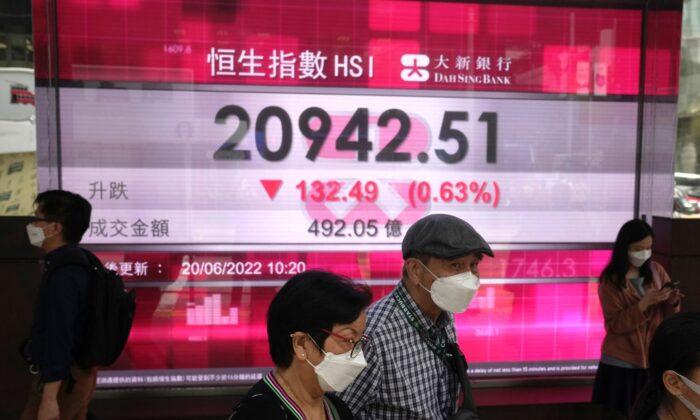TOKYO—European benchmarks were higher Monday after most Asian markets retreated, while the price of bitcoin hovered near $20,000.
U.S. futures advanced and oil prices fell back early Monday.
The price of the world’s most popular cryptocurrency remained near the psychological benchmark of $20,000 after bouncing during the weekend. At one point, bitcoin plunged nearly 10 percent to under $18,600, according to the cryptocurrency news site CoinDesk.
As of 0500 ET (0900 GMT) Monday, it was at $20,650.56.
France’s CAC 40 gained 0.2 percent to 5,893.20. Germany’s DAX added 0.2 percent to 13,150.16. Britain’s FTSE 100 rose 0.5 percent to 7,049.87. U.S. markets are closed Monday for the Juneteenth holiday. The future for the Dow industrials was up 0.4 percent while that for the S&P 500 gained 0.5 percent.
As expected, China kept its 1-year and 5-year loan prime rates unchanged.
Given China’s struggle to bring outbreaks under control and its already faltering economy, “rate cuts in the coming months are still likely as we expect the economic recovery to be slow under the COVID-zero policy. After this rate pause, the government should hand out more fiscal stimulus,” Iris Pang, chief economist Greater China at ING, said in a commentary.
Japan’s benchmark Nikkei 225 slid 0.7 percent to finish at 25,771.22. Australia’s S&P/ASX 200 slipped 0.6 percent to 6,433.40. South Korea’s Kospi dropped 2.0 percent to 2,391.03. Hong Kong’s Hang Seng edged up 0.4 percent to 21,163.91, while the Shanghai Composite was little changed, inching down less than 0.1 percent to 3,315.43.
Two of the world’s three biggest economies, China and Japan, are not engaged in raising interest rates, unlike the U.S. Federal Reserve and central banks in many other countries. Worries that the global economy might slip into recession if planners push ahead too aggressively with interest rate hikes and other moves to tighten monetary policy have caused markets to backtrack after share prices soared thanks to massive support during the pandemic.
Last week, Japan’s central bank stuck to its near zero interest rate policy despite concerns over the weakening yen.
The U.S. dollar was trading at 134.76 Japanese yen, down from 135 yen late Friday. The euro cost $1.0525, up from $1.0489.
Testimony on monetary policy by Federal Reserve Chair Jerome Powell before the Senate Banking Committee and the House Financial Services Panel is set for later this week.
Markets are bracing for a world with higher interest rates, led by the moves by the Federal Reserve. Higher rates can bring down inflation, but they also risk a bringing on a recession by slowing the economy. They also tend to hurt prices for stocks and other investments.
Last week, the Fed hiked its key short-term interest rate by triple the usual amount for its biggest increase since 1994. It could consider another such mega-hike at its next meeting in July. A report last week on the U.S. economy also showed that industrial production was weaker last month than expected.
In energy trading, benchmark U.S. crude lost 42 cents to $109.14 a barrel in electronic trading on the New York Mercantile Exchange. It plunged $7.26 to $107.99 a barrel on Friday. Brent crude, the international standard, fell $1.35 to $111.77 a barrel.






Friends Read Free